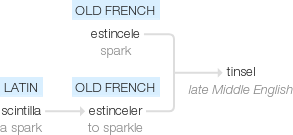Tinsel
late Middle English (denoting fabric either interwoven with metallic thread or spangled): from Old French estincele ‘spark’, or estinceler ‘to sparkle’, based on Latin scintilla ‘a spark’.
wiktionary
The noun is derived from Middle English tinsel(“cloth containing gold or silver thread”)[and other forms], [1] probably from Anglo-Norman tincel, tincelle, tencele, and then: [2]
The noun is derived from Middle English tinsel(“destruction, loss; damnation, spiritual loss; state of damnation”)[and other forms], [4] probably from Old Norse *týnsla (modern Norwegian tynsla(“damage, destruction”)), from týna(“to destroy; to lose; to perish”) (whence Middle English tinen(“to be deprived of, lose; to fail to maintain; to forfeit; to lose track of; to mislay; to be separated from; to escape; to be defeated or forced to withdraw; to waste; to consume, use up; to be destroyed, perish; to damn; to remove, take”)) [5] + -sla( suffix forming nouns from verbs, either denoting the action of the verb or the medium or product of the action). [6]Týna is derived from tjón(“damage; loss”), [7] from Proto-Germanic *teuną(“damage; destruction, ruin; lack”); further etymology uncertain, possibly from Proto-Indo-European *dū-(“to torment, vex”) or *dāw-(“to burn”).
The verb is derived from the noun. [8]
etymonline
tinsel (n.)
mid-15c., "a kind of cloth made with interwoven gold or silver thread," from Anglo-French tencele, Old French estencele, estincelle "spark, spangle" (see stencil (n.)). "In 14-15th c. Fr., the s of es- had long been mute" [OED]. Meaning "very thin sheets or strips of shiny metal" is recorded from 1590s. Figurative sense of "anything showy with little real worth" is from 1650s, suggested from at least 1590s. Use of Tinseltown for "Hollywood" is by 1972.
